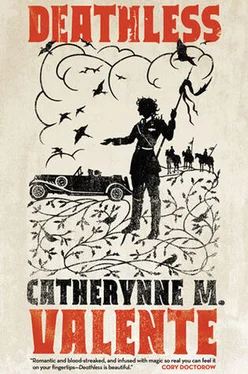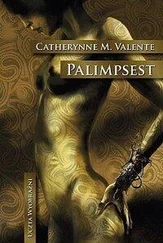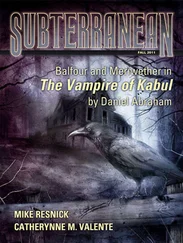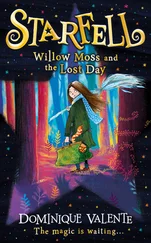The domovoi saluted. His eyes shone with delight. “Excellent! All house matters must immediately be brought to the attention of the komityet! Come! We will make a report! We will file paperwork ! We will make formal complaints !” The domovoi’s voice rose, higher and higher, like a teakettle boiling, until it was little more than an ecstatic squeak. “Follow me! Comrade Chainik shows the way!”
Marya thought she knew the house on Gorokhovaya Street. After all, she had lived there all her life. She had sipped 3,070 bowls of soup in the kitchen with black tile. She had eaten 2,325 entire fish at the cherrywood table with three knots in its center. She had dreamt 5,475 dreams in her little bed with its red blankets. She lived inside the house—she belonged to it. But little Chainik led her past the cobalt-and-silver curtain, past the green-and-gold curtain, down stairs grown rickety with the leaping ministrations of children. He led her creeping, tiptoeing around the rose-printed walls of the parlor (now the Malashenkos’ room, piled high with mirrors, lipsticks, and combs, trophies of Svetlana Tikhonovna’s days as the great beauty of the Kiev stage) and through the ragged linen sheet the Blodnieks had nailed over the kitchen to give their four daughters a kind of rough privacy. Though truly, having the luck to be allocated to the kitchen, where the warm iron stove puffed out ruddy heat, no one pitied the girls in the least.
Chainik scrambled over the sleeping bodies of the Blodniek daughters. The four of them curled together on two mattresses flopped onto the tile, amid a ruin of stumpy candles, saucers, shoes, discarded dresses, and the girls’ prize possession clutched in the youngest sister’s dreaming hands: a London fashion magazine, ten years out of date. Their long hair mingled, brown and rich, flowing back over the bed linens, the color of bread. The domovoi stopped on the shoulders of each to give their ears a little kiss. Marya Morevna held her breath and stepped over each of them, then their mother, her braid tight and severe even in sleep, and finally their father, resting in the position of honor next to the great benevolent stove, its rosy glow dim and delicious. Chainik wedged himself behind the stove and shoved—the stove creaked away from the wall. Papa Blodniek spluttered in his sleep, but did not wake. Chainik shoved again—the little domovoi had a donkey’s strength! The stove scraped forward once more. Mama Blodniek sighed for dreams of days long dead, for rowan berries in her hair and sweet cream on her table. Chainik gritted his yellow teeth and pushed with all his vigor to let Marya squeeze in between the stove and the wall, for she was so much bigger, and the poor imp was not accustomed to making room for anyone but himself. Four daughters turned over in their sleep, each after the other, like a wave rolling across the sand.
Behind the stove was a little door. It was a fine, rich door, arched and tapering to a peak, carved over with the flowers of a happy garden, whose polleny centers were stamped in polished brass. It was as tall as a cathedral entrance for a creature of Chainik’s size, but it barely rose to Marya’s shin. Chainik knocked softly—three times, then two, then three again. The door creaked open.
“Comrade Chainik,” Marya whispered. “I am too big! I shall never fit through!”
“We must all tighten our belts!” hissed the domovoi, and yanked on the sash of her nightgown. Marya spun like a spool; she had the peculiar feeling of a huge hand pressing down on the crown of her skull, of her ribs being squeezed as though Chainik were lacing her into one of her mother’s old corsets. When he tucked her sash back into place, Marya faced the carved door once more. She had dwindled down until she was just barely small enough to fit inside the door, if she ducked. Marya fought to keep herself from laughing out loud—magic, Pushkin’s magic, real magic, and done to her!
“Your bones are so stubborn!” snorted Chainik. “It’s almost as though you don’t want to shrink at all! Brazen thing, why do you want to be so tall?”
“I should never reach the top bookshelf otherwise,” she protested, and the domovoi shrugged as if to say: The ways of girls and other big folk are arcane and incomprehensible.
He led Marya through a dank hall, past three layers of padded wall, a stony escapement, and a loamy passage with bits of worm and grass-root poking through the clayey dirt. Finally, these gave way to floorboards and a curious wallpaper: dozens upon dozens of Party pamphlets plastered against the earthen wall, holding back stone and mud.
The Workers Have Nothing to Lose but Their Chains! cried a painted earnest man with his fist in the air.
Beware Mensheviks, SR Loyalists, and Tsarist Generals! Bishops and Landlords Follow Closely Behind! warned a child beset by demon-faced soldiers.
Down with Kitchen Slavery! Give Us a New Life Under Socialism! announced a woman in a red kerchief, brandishing her broom.
Elect WORKERS to the Soviet! Do Not Elect Shamans or Rich Men! admonished a group of white-clad young voters.
Marya touched the papery faces of young girls with rosy cheeks. ALL Society Must Transform into a Workers’ Collective! they told her.
The hall opened onto a broad room with its own high birch rafters and a cheerful hearth, small rugs on the floor, and a curious, fabulous flotsam jammed into every corner: heavy, gold-rimmed mirrors; polished silver doorknobs; china plates with tiny violets on their rims; copper teakettles; garden shears; thick goose-down pillows; an emerald-colored smoking jacket and a wide assortment of pipes; delicate snuffboxes with enameled lids; a heavy silver hairbrush with boar bristles and combs with tiny glass gems set into their teeth; a phonograph with a great golden bell; a croquet set with bright balls; a black lace fan with a long blue tassel. All this odd treasure surrounded a large table at which sat twelve little men, all like Chainik in their red vests and split mustaches, except that some of them had black hair and some blond, and some of them were women—though they had fine, thin mustaches as well, but no beards.
“Comrade Chainik, why have you brought this giant with you? She ought to be safe in her bed, dreaming of strawberries and laundry!” cried one of the other domovoi, who had an enormous golden medal on his chest—though when Marya peered closer, she saw it was nothing more than a disassembled pocket watch, made to hang down beautifully like a medal of courage.
“Chairman Venik!” Marya’s guide replied in wounded tones. “She has a report to make! I would not rob the komityet of the opportunity to hear delicious testimony, to make piquant judgments, to carry out policies sweeter than oatcakes!”
The table sighed in relief and nodded vigorously to one another.
A domovaya raised her hand and was recognized by Venik. “I am Comrade Zvonok,” she said in a brash, ringing voice, tugging at her silky blond mustache. “And I formally invite the giantess emissary from the House Above to deliver her report.”
“Hear, hear!” shouted the komityet, rapping the table with their knuckles.
Marya still towered over most of them—seated, they came to her waist, and she felt it was only polite to sit down on the floor, so that she did not shame them.
“First, you must understand,” she said, suddenly shy, “I did not believe in domoviye before tonight.”
Silence, bricked-up and mortared over, greeted her.
Marya hurried to fill it up, to appear wise and learned so that they would not banish her when she had only just arrived. Her cheek warmed where a child had slapped her once, years before. “I mean to say: I believed that there might be domoviye in the world—there might be anything in the world. But my education was … rather specialized, and I did not assume that the presence of birds who turn into husbands indicated domoviye and a door behind the stove.”
Читать дальше












